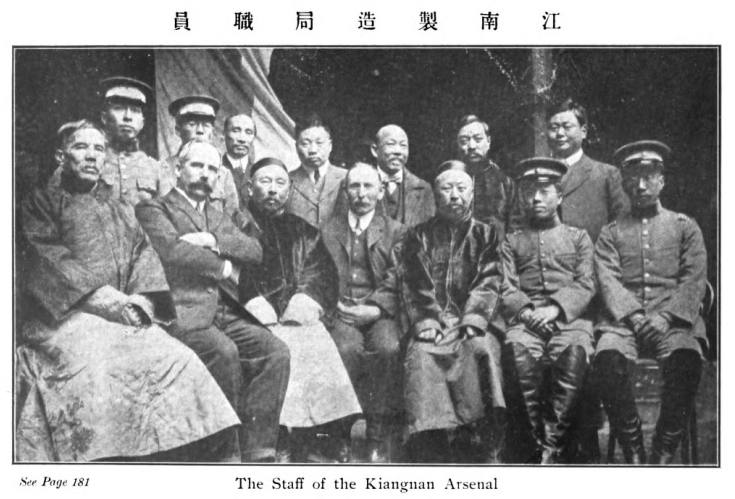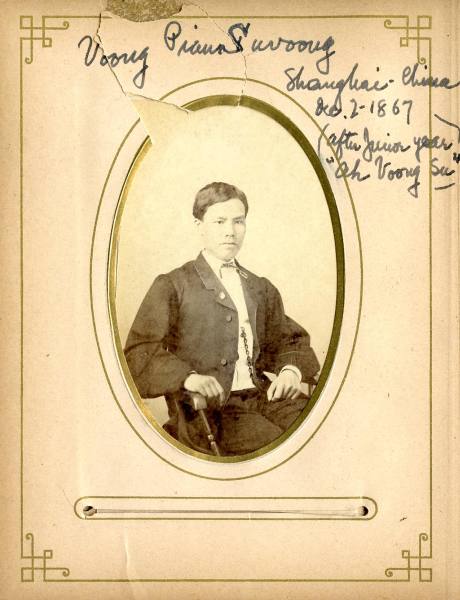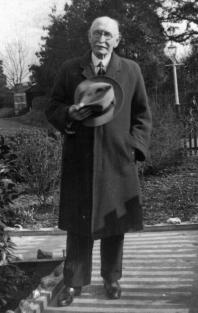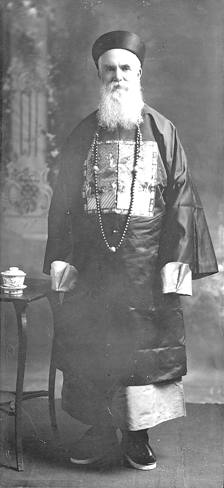John Fryer was baptized into the Anglican Church when he was in secondary school. He
completed his schooling in Humbury, London, in 1860. He reached Hong Kong in
1861 to tutor at St. Paul's College. In 1863, invited by the Church Missionary
Society (CMS), he went to serve in a Chinese government school. In 1865, he left
the CMS to set up the Anglo-Chinese College in Shanghai. In 1868, he was
concurrently and editor and translator in the Jiangnan [Kiangnan] Manufacturing Bureau in
Shanghai, translating many scientific books. Although he preferred to do mission
work in inland China rather than secular work, Fryer was mainly engaged in
educational work. He compiled a six-volume collection of Chinese scientific
books in 1875 and set up the Chinese Scientific Book Depot in 1885. He helped
establish the Institution for the Chinese Blind, and his son George became
headmaster of the Fryer School for the Deaf and Dumb.
Fryer was commended twice by the Qing dynasty for his contributions to China.
He was appointed a professor of Eastern literature at the University of
California in 1896 and continued as an honorary professor after his retirement
in 1915. Among his works are The Educational Dictionary for China and Admission
of Chinese Students to American Colleges.
From Fairfax County Stories:
In 1870, V. P. Suvoong, a 26- year old male Chinese student resided in Falls Church Township in Fairfax County.
His name was Vung Piau (also written in other documents as Pian or
Piang) Suvoong and he was a very intelligent and accomplished medical
missionary.An American missionary report described him as a Dr. Suvoong
who comes on Sundays to treat any difficult cases that might occur, “a
Chinaman who has spent 15 years in the US pursuing his studies and was a
pupil of Dr. Agnew in New York.He has made diseases of the eye and ear a
specialty, and is very skillful in this department.” (May 1875 annual
report of the Presbyterian Church Mission in China page 68)
Suvoong probably arrived in the US in 1864.I found him listed in the
1900 Phi Beta Kappa handbook as an 1867 Phi Beta Kappa graduate of
Kenyon College in Gambier, Ohio – the oldest private college in Ohio
founded in 1824.The small, all-male college originally graduated
clergymen for frontier America but soon became a highly regarded seat of
classical education with graduates including statesmen such as US
President Rutherford B. Hayes.
Suvoong was in Alexandria, Virginia on May 15, 1868 when he was
recommended as a candidate for deacon’s orders.The historical record of
the Virginia Technological Seminary indicated that Suvoong graduated in
1870.
From 1867 to 1870, Suvoong lived in the Falls Church Township of Fairfax
County, Virginia as a student of the Virginia Theological Seminary in
Alexandria.The seminary’s faculty and students attended services in the
Falls Church Episcopalian Church that was built in 1732 on the road to
the falls of the Potomac River.
The Census record indicates that Suvoong’s story in Fairfax County was
related to the Protestant missionary work in China that began in 1807
with Robert Morrison of the London Missionary Society and ended in
1953.His classmate in the Virginia Theological Seminary Thomas Boone
appears to be related to the Reverend William James Boone who in 1843
was appointed to the Protestant Episcopal Mission in Shanghai and served
as the first Episcopalian missionary bishop of China from 1844 until
his death on July 17, 1884
The next record in my search for Suvoong was the Alpha Delta Phi report
that in 1873,VungPian Suvoong, received his medical degree from Columbia
College in New York.So, after graduating in 1870 from the Virginia
Theological Seminary in Fairfax County, Suvoong moved to New York City.
Then Suvoong went back to China and became very active in medical
missionary work in Shanghai.The 1875 report of the Shanghai Presbyterian
Church noted that difficult cases were referred to Dr. Suvoong.And in
1880, a Mr. Farnham of the American Presbyterian Board noted that “ Dr.
Suvoong subsequently studied medicine, and in the special departments of
the eye and ear is supposed to have no equal in the East. “
In 1881, the Department for the Translation of Foreign Books at the
Kiangnan Arsenal, Shanghai,(established in 1869) reported that Suvoong
took over a translator job, adding that he was “ a Chinese graduate of
the United States who has begun to enrich the collection of books by
translations of medical and other works for which task his long
residence and studies in America have well qualified him.”Suvoong was
also reported as teaching English. And in 1893, Suvoong joined the
Freemason at the Masonic Hall in Shanghai
Suvoong’s medical expertise was invoked during a 1904 hearing in the US
State Department about intervention with England to relieve China from
compulsory treaty obligations to tolerate the opium traffic.The remarks
of Frank D. Gamewell, 20-year missionary in China and officially
representing the Methodist Episcopal Missionary Board included the
following statement: One of the best known medical men of New York City,
knowing that I had been in China, spoke to me some years ago of a
Doctor Suvoong, a Chinese who had received his medical education in the
US and whom he regarded as one of the most remarkable men he had met.
This Dr. Suvoong says: “Opium is a moral poison and is largely
responsible for the decay of the Empire."
Suvoong wrote many articles in Chinese medical journals and maintained
his respect and affection for his American education. He named his son
after his medical professor – Cornelius Agnew Suvoong was born in China
on the 12th of December 1877. He graduated from the University of
Aberdeen in Scotland in 1900 and received his diplomate in Tropical
Medicine in 1904.



